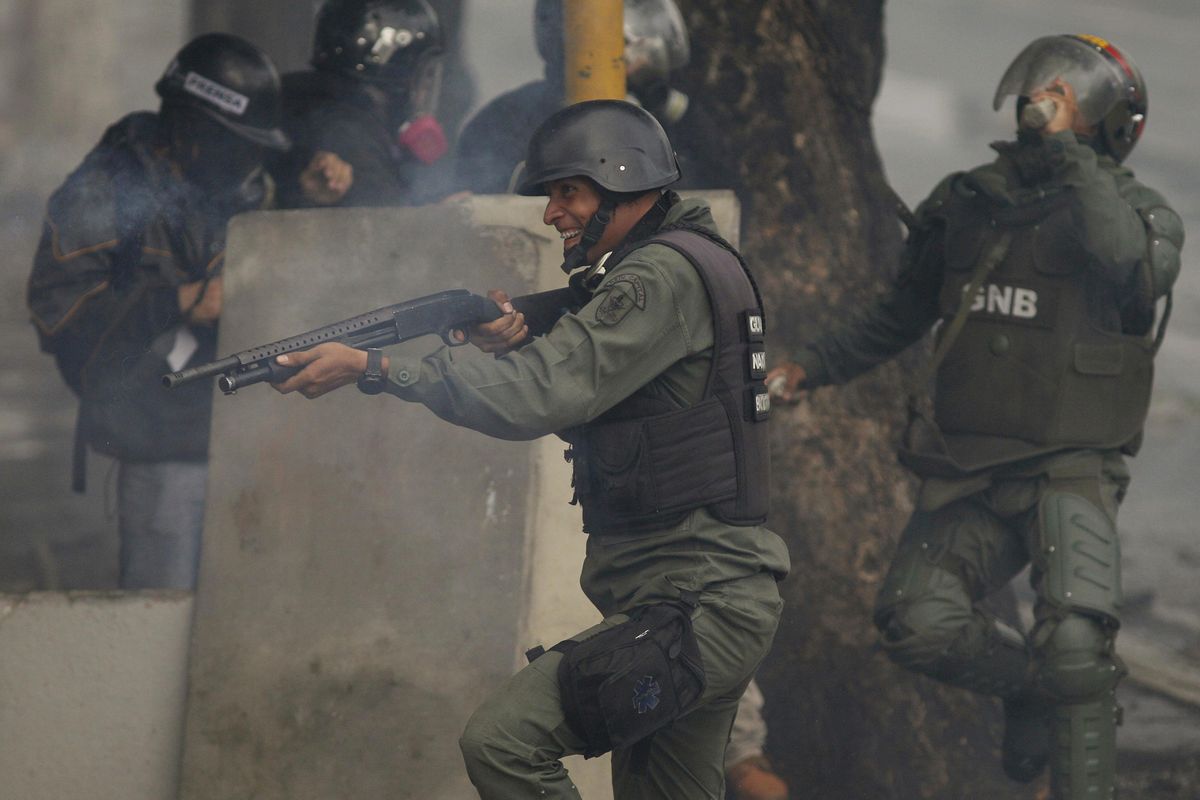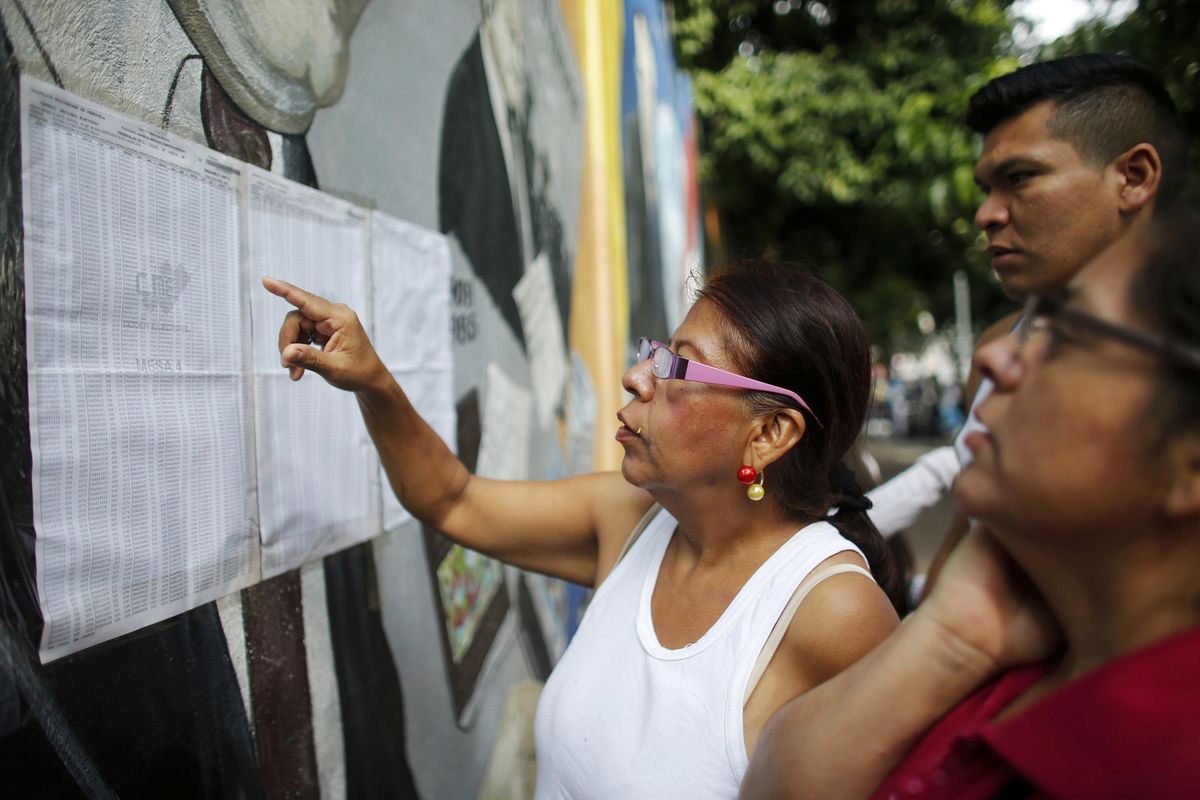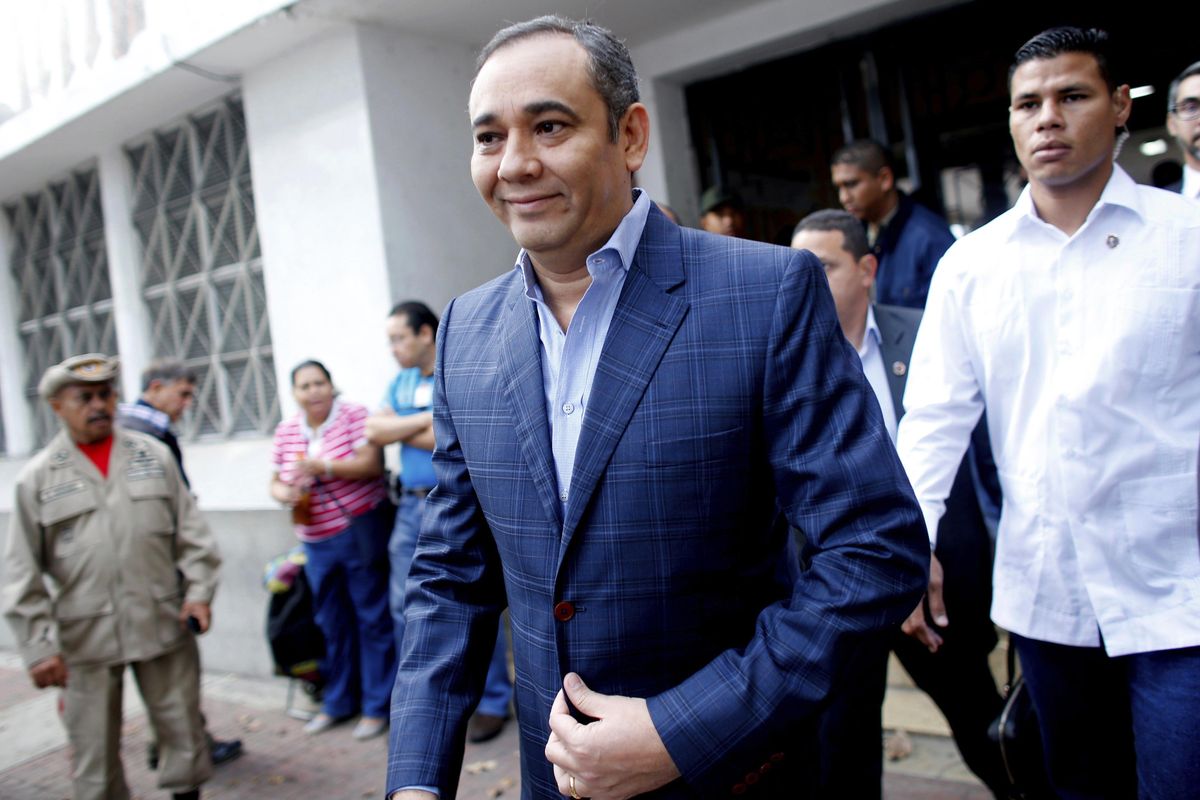Venezuela: More than 8 million grant government more power
People check their voting machine at a list of voters provided by Venezuelan National Electoral Council, CNE, outside of a poll station during the election for a constitutional assembly in Caracas, Venezuela, Sunday, July 30, 2017. The run-up to Sunday’s vote has been marked by months of clashes between protesters and the government. (Ariana Cubillos / Associated Press)
CARACAS, Venezuela – Venezuelan electoral authorities said more than 8 million people voted Sunday to create a constitutional assembly endowing President Nicolas Maduro’s ruling socialist party with virtually unlimited powers – a report more than double the estimates of independent experts and opposition leaders who met the announcement with fury and derision.
National Electoral Council President Tibisay Lucena announced just before midnight that turnout was 41.53 percent, or 8,089,320 people. Members of the opposition said they believed between 2 million and 3 million people voted and one well-respected independent analysis put the number at 3.6 million.
The electoral council’s vote counts in the past have traditionally been seen as reliable and generally accurate, but Sunday’s widely mocked announcement appeared certain to escalate the polarization and political conflict paralyzing the country.
“The people have delivered the constitutional assembly,” Maduro said on national television. “More than 8 million in the middle of threats … it’s when imperialism challenges us that we prove ourselves worthy of the blood of the liberators that runs through the veins of men, women, children and young people.”
Across the capital, Venezuelans had appeared to be staying away from the polls in huge numbers in a show of protest against the vote. Venezuela’s chief prosecutor’s office reported 10 deaths in new rounds of the clashes between protesters and police that have killed at least 125 and wounded nearly 2,000 since protests began in April. Seven police officers were wounded when a fiery explosion went off as they drove past piles of trash that had been used to blockade a street in an opposition stronghold in eastern Caracas.
“If it wasn’t a tragedy … if it didn’t mean more crisis, the electoral council’s number would almost make you laugh,” opposition leader Freddy Guevara said on Twitter. Maduro has threatened that one of the constitutional assembly’s first acts would be jailing Guevara for inciting violence.
An estimated 3.6 million participated in the vote, according to one exit poll based on surveys from 110 voting centers conducted by New York investment bank Torino Capital and a Venezuela public opinion company. That number equates to about 18.5 percent of registered voters.
“The results thus suggest that the government maintains an important loyal core of supporters that it can mobilize in both electoral and non-electoral scenarios,” the report concluded.
The same exit poll also noted that Venezuela has an estimated 2.6 million government employees, “suggesting that a large fraction of the votes could have not been voluntary.”
A list of nations including Argentina, Canada, Colombia, Mexico, Panama, Paraguay, Spain, Britain and the United States said they would not recognize Sunday’s vote. The Trump administration again promised “strong and swift actions” against Venezuelan officials, including the 545 participants in the constitutional assembly, many of them low-ranking party members. The U.S. did not say whether it would sanction Venezuelan oil imports, a measure with the potential to destabilize Maduro’s government and deepen the country’s humanitarian crisis.
Maduro said he had received congratulations from the governments of Cuba, Bolivia and Nicaragua, among others.
Across this capital of more than 2 million people, dozens of polling places were virtually empty Sunday, including many that in previous elections saw hours-long lines of thousands voting to keep the government in power over the last two decades.
At the Poliedro sports and cultural complex in western Caracas, several thousand people waited about two hours to vote, many drawn from opposition-dominated neighborhoods where polling places were closed. But at least three dozen other sites visited by The Associated Press had no more than a few hundred voters at any one time, with many virtually empty.
Opposition leaders had called for a boycott of the vote, declaring it rigged for the ruling party, and by late afternoon they were declaring the apparent low turnout to be a resounding victory. Ahead of the vote, the opposition organized a series of work stoppages as well as a July 16 protest vote that it said drew more than 7.5 million symbolic votes against the constitutional assembly.
“It’s very clear to us that the government has suffered a defeat today,” said Julio Borges, president of the opposition-controlled but largely powerless National Assembly. “This vote brings us closer to the government leaving power.”
Opposition leader Henrique Capriles urged Venezuelans to protest again Monday.
Maduro called the vote for a constitutional assembly in May after a month of protests against his government, which has overseen Venezuela’s descent into a devastating crisis during its four years in power. Thanks to plunging oil prices and widespread corruption and mismanagement, Venezuela’s inflation and homicide rates are among the world’s highest, and widespread shortages of food and medicine have citizens dying of preventable illnesses and rooting through trash to feed themselves.
The winners among the 5,500 ruling-party candidates running for 545 seats in the constituent assembly will have the task of rewriting the country’s constitution and will have powers above and beyond other state institutions, including the opposition-controlled congress.
Maduro made clear in a televised address Saturday that he intends to use the assembly not just to rewrite the country’s charter but to govern without limitation. Describing the vote as “the election of a power that’s above and beyond every other,” Maduro said he wants the assembly to strip opposition lawmakers and governors of constitutional immunity from prosecution – one of the few remaining checks on ruling party power.
Declaring the opposition “already has its prison cell waiting,” Maduro added: “All the criminals will go to prison for the crimes they’ve committed.”
He said the new assembly would begin to govern within a week, with its first task in rewriting the constitution to be “a total transformation” of the office of Venezuela’s chief prosecutor, a former government loyalist who has become the highest-ranking official to publicly split from the president.
“People aren’t in agreement with this,” Daniel Ponza, a drywall contractor, said Sunday as he watched a few dozen people outside a polling place in El Valle, a traditional stronghold of the ruling Chavista movement in western Caracas. “People are dying of hunger, looking for food in the trash. And I think this is just going to make things worse.”
Still, for many others, the looming likelihood of authoritarian government was appealing after months of street blockades and street clashes.
Sculptor Ricardo Avendano traveled from the opposition-dominated eastern neighborhood of Las Mercedes to vote at the Poliedro complex, saying the government needed total power to control food prices and shut down protests.
“The most important thing is imposing order,” he said. “If I’d been president there wouldn’t be protesters in the streets. They’d be prisoners.”






